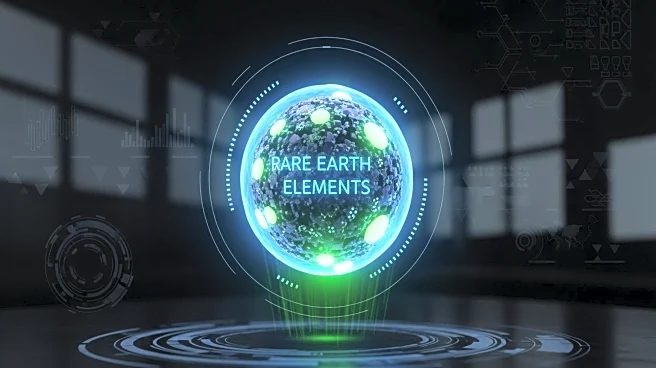What's Happening?
China has announced new restrictions on the export of rare earth minerals, tightening its control over the global supply of these critical materials. The move comes as part of a broader trade conflict with the United States, with President Trump threatening
additional tariffs in response. Rare earth minerals are essential for the production of various technologies, including smartphones, electric vehicles, and military equipment. China's near-monopoly in rare earth processing has given it significant leverage in trade negotiations, and the new rules require foreign companies to obtain Chinese government approval for exports containing rare earths. This development has disrupted the fragile truce between the U.S. and China, with both countries imposing new port fees on each other's ships.
Why It's Important?
The restrictions on rare earth exports by China have significant implications for U.S. industries reliant on these materials, particularly in technology and defense sectors. The U.S. has been investing in alternative sources, but remains heavily dependent on Chinese supplies. The new controls could lead to increased costs and supply chain vulnerabilities for American companies. Additionally, the strategic value of rare earths gives China leverage in trade negotiations, potentially affecting broader economic relations between the two countries. The situation underscores the importance of diversifying supply sources to mitigate risks associated with geopolitical tensions.
What's Next?
President Trump and China's President Xi Jinping are expected to meet later this month, with the rare earth restrictions likely to be a key topic of discussion. The U.S. may consider lowering tariffs or imposing further trade restrictions to counter China's actions. Meanwhile, China has indicated a willingness to engage in negotiations, suggesting potential for de-escalation. However, the timing of the restrictions has disrupted U.S. negotiation plans, and the outcome of upcoming talks remains uncertain. The U.S. may also explore increasing domestic production and processing capabilities to reduce reliance on Chinese exports.
Beyond the Headlines
China's strategic use of rare earths highlights the broader geopolitical implications of resource control. The country's dominance in processing these materials is a result of years of investment in research and development, creating a significant talent pool and advanced infrastructure. The U.S. faces challenges in catching up, with estimates suggesting it could take years to develop comparable capabilities. The situation also raises ethical questions about resource dependency and the need for sustainable and diversified supply chains. As global demand for rare earths continues to grow, the geopolitical landscape surrounding these materials is likely to become increasingly complex.















